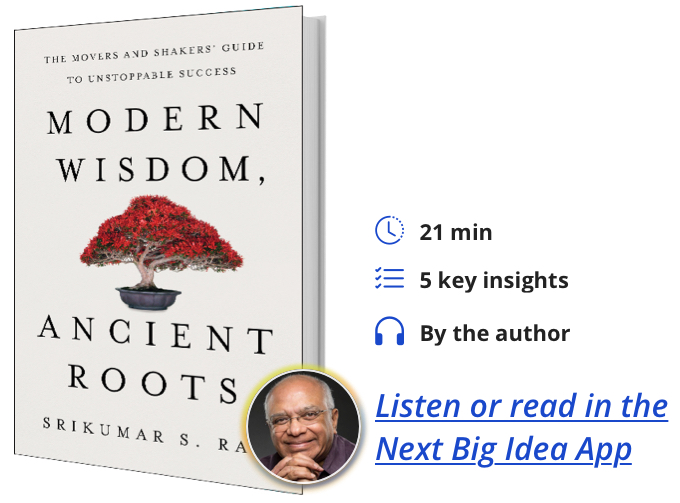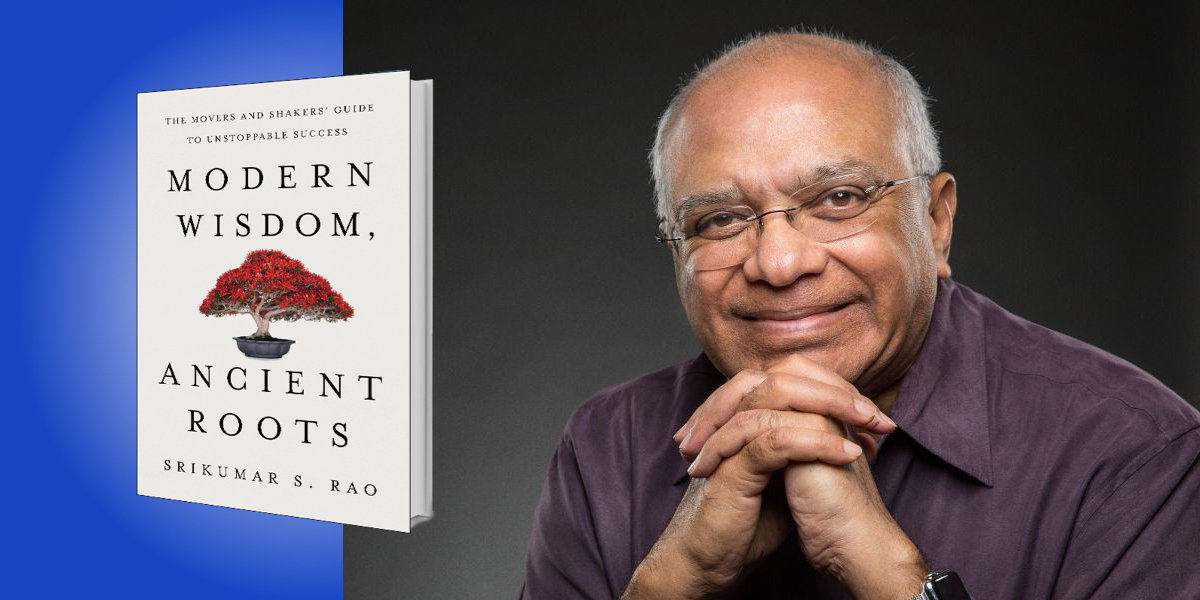Srikumar Rao is an executive coach, speaker, former business school professor and creator of Creativity and Personal Mastery.
Below, Srikumar shares 5 key insights from his new book, Modern Wisdom, Ancient Roots: The Movers and Shakers’ Guide to Unstoppable Success. Listen to the audio version—read by Srikumar himself—in the Next Big Idea App.

1. Change can happen rapidly, even overnight.
Many believe that, by the time we reach adulthood, we have been fundamentally shaped and will not change much for the rest of our lives. This notion has been enshrined in our language and popular culture. We all know that “You cannot teach an old dog new tricks.”
I profoundly disagree. You can change. This change can happen dramatically and overnight. It can also be lasting. Sri Ramakrishna, the nineteenth-century Indian sage, is believed to have asked, “Imagine a cave sealed in a mountain for thousands of years. Then you remove the rocks that have blocked its entrance. Does the darkness dissipate little by little? Or does it vanish instantly?” No matter how many centuries blackness has lingered, it disappears when exposed to light. No matter how many decades your behavior has persisted, it can change in an instant.
The trick is to learn how to engineer this change. You cannot do it by force of will. The way you can do it is by changing the mental models you use to view the world. These models cumulatively determine who you are. As you make changes in them, you literally become a different person, and then everything changes.
It is not always easy to recognize the mental models you hold, so there is hard work required to identify them. Once you have done so, you can make changes in them. You’ll find that a small tweak in a mental model can make a huge difference in your experience of life.
2. Where you live matters.
Every real estate agent learns early that the most important thing is location, location, location. It matters hugely where you live. Where you live determines how happy you are and whether there is meaning and joy in your life.
And yet, most of us choose to live in hovels and surround ourselves with garbage, even excrement. We don’t live in a bungalow, duplex, mansion, or apartment. We live in our minds. That is our permanent residence—a place where there are no constraints of square footage. It’s a vast space with unlimited area. We have the power to draw and redraw our boundaries as we see fit in order to create our ideal surroundings.
No matter how grand our rooms, balconies, garages, and verandas are, our life is good only when things are clean and sorted in our mind. Yet that is where we keep things messy. Regrets piled up in one corner. Expectations stuffed in a closet. Secrets under the carpet. Worries littered everywhere. Comparisons spilled on the table. Complexes leaking from bottles. Grudges stinking in a box. And anxieties in every room.
“Start observing your mental chatter and note how it takes you to places and then triggers the emotions you feel.”
Be aware. This is our real home, and we cannot outsource the housekeeping. We have to do it ourselves. You feel stressed and are painfully conscious of where you could have been, and should have been, as well as where others are and you are not. This is because your mental chatter is running your life. It is designing the house you live in.
There is a simple solution for this. Start observing your mental chatter and note how it takes you to places and then triggers the emotions you feel. When you observe your mental chatter, you quickly see that it takes you to places you would rather not visit.
It is actually quite easy to turn it around, much as you would a horse you are riding. When envy raises its green head, direct your thoughts to how much you have to be grateful for. From that place of gratitude, try to do better.
3. Your awareness is like a flashlight. Use it intelligently.
Your awareness is like a flashlight. What does a flashlight do? It illuminates whatever you shine it on. Direct it to the ceiling and it lights up the ceiling. Point it at the floor and it lights up the floor.
To demonstrate the power of this concept right now, direct the flashlight of your awareness to the chair in which you are sitting. As you do so, you become aware of the pressure of your buttocks on the seat. You feel the fabric, or leather, against the back of your thigh. Thirty seconds ago you were not aware of any of this, but now you are. Why? Because you directed your flashlight of awareness to your seat.
Where do we typically direct the flashlight of our awareness? We typically shine it on the two, three, or four problems in our life. More precisely, on the two, three, or four things that we have arbitrarily decided are the problems in our life. What about the 50, 60, or 200 things that are actually pretty good about our life? We never direct our flashlight of awareness on them, so they pass by in the background, unnoticed. Not a good strategy.
You are incredibly privileged. You don’t have to worry about whether you’re going to have dinner tonight. You have a bed to sleep in. You have a roof over your head. All of this is a big deal in a big chunk of the world. When I point all of this out, you nod your head. Yes, you are incredibly privileged. But you don’t feel incredibly privileged. You feel put upon and stressed out. Why is that? It’s because of where you shine the flashlight of your awareness.
Use a different strategy. Consciously, deliberately shine the flashlight of your awareness on the many ways in which you are truly blessed. Do it last thing at night before you go to bed. When you get up in the morning, don’t go immediately to the space of “I have too much to do and not enough time to do it all.” Instead, dwell on the many ways in which your lot is better than that of most of the world.
“Consciously, deliberately shine the flashlight of your awareness on the many ways in which you are truly blessed.”
As you go through your day, constantly shine the flashlight of your awareness on the blessings in your life. It is my hope that you will occupy the default emotional domain of appreciation and gratitude. There’s a reason for that. When you’re in the emotional domain of appreciation and gratitude, you’re not anxious, nervous, fearful, or stressed. They cannot coexist.
4. Cultivate extreme resilience: Good thing, bad thing or who knows?
Resilience is your ability to bounce back from adversity. This, of course, is good. In extreme resilience, you bounce back from adversity so fast that an external observer might not even know that you had been struck by an adverse event.
An old Sufi tale gives the key to cultivating extreme resilience. A man and his son lived in a beautiful valley. They were very happy, but they were also dirt poor. The man decided that he was going to become rich. The way he was going to do so was by breeding horses. He bought a stallion. He did not have money to buy a stallion, so he borrowed heavily from the neighbors. The very day he bought the stallion, it kicked the top bar loose from the paddock where he housed it and ran away. The neighbors came around commiserating. “You were going to become a rich man, but your stallion has run away. And you still owe us money. You are screwed.” The man shrugged his shoulder and said, “Good thing, bad thing? Who knows?”
The stallion fell in with a group of wild horses which were close to where the man lived, and he was able to entice them into his paddock, which he had repaired, so escape was no longer possible. He now had the stallion back, plus about a dozen wild horses. By the standards of that village, he was now a wealthy man. The neighbors came around envious. “We thought you were destitute, but Fortune has smiled upon you. How lucky you are.” The man shrugged his shoulder and said, “Good thing, bad thing? Who knows?”
The man and his son started to break the horses so they could sell them on the market. One of the horses threw the man’s son and stomped on his leg. It broke and healed crooked. The neighbors came around. “He was such a fine young lad. Now he’ll never be able to find a girl to marry him. How sad.” The man shrugged his shoulder and said, “Good thing, bad thing. Who knows?”
That summer, the king of the country declared war on a neighboring country. Press gangs moved through the villages, rounding up all the able-bodied young men to serve in the army. This man’s son was spared because he had a game leg. The neighbors had tears in their eyes as they moaned, “We don’t know if we’ll ever see our sons alive again. But you still have your son. How lucky you are.” And the man shrugged his shoulders and said, “Good thing, bad thing. Who knows?” And it goes on like that forever.
Think about your life. Can you recall anything that happened that, at the time it happened, you thought “This is terrible?” But now, with the passage of time and greater wisdom, you can look back upon it and say, “That wasn’t so terrible.” Or maybe even, “That was a good thing that happened.” Most people can.
“Is it possible that what you’re today about to label “bad” could eventually turn out to be a good thing?”
I remember a bitterly contested divorce case in New York. The assets were equally divided but the wife was aggrieved because she got cash and her ex-husband got the equivalent in a stock portfolio run by a well-known manager who had delivered superior returns for years. A year later she thanked her lucky stars as the manager, Bernie Madoff, was taken away in handcuffs.
Is it possible that what you’re today about to label “bad” could eventually turn out to be a good thing? Just asking that question will take you to a different emotional domain. If you then ask yourself the next question, “What can I proactively do to actually make it a good thing?” you move seamlessly from the realm of despair to the realm of possibility.
That is how you become extremely resilient. You never have to bounce back from adversity because you never label anything that happens to you as adversity. You simply label it “This happened.”
5. You can have a terrific day, every day.
Over the phone or on Skype or Zoom, I ask many of my clients how they are doing. I often get responses like “hanging in there” and “can’t complain” and “OK.” A rare few say “super” or “fantastic.” Many more say “terrible” or “could be better.”
I will show you how you can have a terrific day every day. It is simple. It also can be ridiculously easy or fiendishly difficult, depending on how open you are to accepting new ideas and implementing them in your life. Here is what you must do to have a superlative day today and every day. When you wake up in the morning, make a conscious, mindful decision that you are going to have a fantastic day. Don’t laugh. This really works.
The problem that most people have is that they confuse having a terrific day with two things that have nothing to do with having a terrific day. They never examine their beliefs about these two things, and so they get stuck in erroneous thinking, and they have terrible days as a result.
This erroneous thinking is that you believe that for you to have a terrific day, the stuff that you want should happen and the stuff that you do not want should not happen.
So, you’re all set to have a great day, and then your car does not start. When you finally get on the road, somebody sideswipes you, leaving a long scratch and a dent on your door. He doesn’t stop, so you don’t get his license plate number. You’re late for your meeting, and the deal you were hoping to close has to be postponed. Your prospect’s secretary does not book another appointment for you because she says he is, “Thinking it over.”
So, it is turning out to be a lousy day, right? Only if you let it become lousy. Lots of stuff happened. You would rather it did not happen, but it did. Why compound the problem by releasing your intention of having a terrific day?
Think about it. Feces will drop from the sky. It always does. That is the nature of life. When feces drops from the sky you have to put aside your plans and do some cleanup work. That does not mean, however, that you cannot have a terrific day. It simply means there is some unexpected cleanup you need to put into your terrific day. If you are smart, you will schedule this and put an hour or two into your calendar to clean up the mess you will inevitably confront.
When unexpected, unwanted stuff happens, simply ask it, as if it were a person, “Am I going to let you steal my fantastic day from me?” If you truly get into the habit of doing this, you will not let anything steal your fantastic day from you. You will be pleasantly surprised at how many of your days become marvelous.
And no, this is not well meaning and impossible to heed pablum unless you decide it is. Give it a try.
To listen to the audio version read by author Srikumar Rao, download the Next Big Idea App today:
































